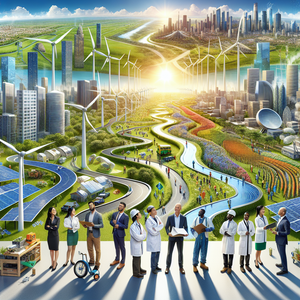Tesla's Role in the Global Renewable Energy Movement

Tesla's foray into solar energy began with its acquisition of SolarCity in 2016, a strategic move that expanded the company's reach into solar technology. Tesla has since developed a suite of products designed to harness solar energy efficiently. Among these is the Solar Roof—a roofing system integrated with solar cells that blends seamlessly into the architecture of homes. This innovative approach not only provides homeowners with a renewable energy source but also enhances property aesthetics, addressing a common concern potential adopters have regarding the visual impact of traditional solar panels. The Solar Roof's unique design caters to consumers who may be hesitant to adopt solar technology due to aesthetic considerations. Additionally, Tesla's solar products are engineered to work synergistically with its energy storage solutions, primarily the Powerwall. This home battery system stores excess solar energy generated during the day for use during peak demand times or outages, ensuring that homeowners can maximize their renewable energy usage while reducing reliance on grid-supplied electricity.
Advancements in Battery Storage Technology
Central to Tesla's renewable energy strategy is its commitment to advancing battery technology. The company's innovations in lithium-ion battery technology have not only revolutionized electric vehicles but have also significantly impacted energy storage solutions. Tesla's product lineup includes the Powerwall for residential use, the Powerpack for commercial applications, and the Megapack for utility-scale energy storage. For instance, the Megapack can store large amounts of energy generated from renewable sources, making it an essential component in stabilizing the grid as the world transitions to more intermittent energy sources like wind and solar. These battery systems facilitate energy storage during periods of low demand, allowing for energy release during peak usage times. This capability effectively manages supply and demand while reducing reliance on fossil fuels. A notable example is Tesla's participation in large-scale energy storage projects, such as the Hornsdale Power Reserve in Australia, which utilizes its lithium-ion battery technology to provide grid stability and support renewable energy integration.
Partnerships and Collaborations
Tesla's commitment to renewable energy is further exemplified through collaborations with various organizations and governments. The company has partnered with utilities to deploy large-scale energy storage solutions that enhance grid stability. For instance, the Hornsdale Power Reserve project in Australia has demonstrated how battery storage can mitigate the challenges posed by variable renewable energy sources, showcasing Tesla's technology and its potential to revolutionize energy systems. Moreover, Tesla has sought to integrate its technology into broader energy ecosystems, collaborating with other innovators in the field. These partnerships aim to create interconnected systems that allow for greater efficiency and reliability in energy distribution. By working alongside other stakeholders, Tesla is not only innovating but also contributing to the development of a more sustainable energy landscape on a global scale.
Impact on Energy Consumption Patterns
Tesla's influence extends beyond technology; it is reshaping energy consumption patterns worldwide. By promoting solar energy adoption and energy storage solutions, Tesla empowers consumers to become active participants in energy generation. This shift from passive consumption to active generation fosters a culture of sustainability, where individuals and communities take control of their energy sources. As more consumers adopt Tesla's solar and storage products, the demand for fossil fuels diminishes, leading to broader societal changes. The proliferation of renewable energy solutions inspires other companies to innovate and invest in similar technologies, amplifying the impact of Tesla's initiatives. This dynamic not only enhances energy independence but also facilitates a cultural shift toward sustainability.
Tesla's role in the global renewable energy movement extends far beyond its electric vehicles. With groundbreaking innovations in solar energy and battery storage, combined with strategic partnerships and a steadfast commitment to sustainability, Tesla is leading the charge toward a cleaner, more sustainable future. As the world grapples with climate change and the urgent need for renewable energy solutions, Tesla's initiatives not only contribute to a transformative shift in energy consumption patterns but also inspire a collective movement toward sustainable living. The company's vision and technology serve as a beacon for what the future of energy could look like—one that is renewable, accessible, and efficient. In a world increasingly aware of its environmental responsibilities, Tesla stands at the forefront, championing a transition that could redefine our energy landscape for generations to come.
Solar Energy Project Manager
Sunrun, First Solar, Tesla
Core Responsibilities
Oversee the planning, execution, and delivery of solar energy projects, ensuring they meet budget and timeline constraints.
Coordinate with stakeholders, including engineers, contractors, and regulatory bodies, to ensure compliance with local laws and standards.
Evaluate project feasibility through site assessments and financial analyses to determine return on investment.
Required Skills
Strong understanding of solar technology and energy market trends.
Proven project management experience, ideally in renewable energy installations.
Familiarity with industry software for project management (e.g., MS Project or Primavera).
Battery Systems Engineer
Tesla, Panasonic, LG Chem
Core Responsibilities
Design and develop advanced battery systems for energy storage solutions, focusing on performance, safety, and efficiency.
Conduct tests and simulations to evaluate battery capacity, life cycle, and thermal management.
Collaborate with cross-functional teams to integrate battery technologies into Tesla’s energy products.
Required Skills
Strong background in electrical engineering, materials science, or related fields.
Proficiency in simulation software (e.g., ANSYS, MATLAB) and knowledge of battery chemistry.
Experience with lithium-ion battery technology and energy management systems.
Renewable Energy Policy Analyst
Tesla, EDF Renewables
Core Responsibilities
Analyze local, state, and federal policies affecting renewable energy markets and advocate for sustainable practices and legislation.
Research and prepare reports on the economic and environmental impacts of renewable energy initiatives.
Engage with stakeholders, including government officials, advocacy groups, and industry leaders, to promote Tesla’s policy objectives.
Required Skills
Strong analytical skills with the ability to interpret complex energy policies and regulations.
Excellent communication skills, both written and verbal, to convey policy insights effectively.
Familiarity with environmental advocacy and economic modeling related to energy markets.
Energy Storage Solutions Consultant
Tesla, Energy Storage Association
Core Responsibilities
Provide expertise and guidance to clients on the implementation of energy storage systems, focusing on maximizing efficiency and sustainability.
Conduct site assessments to determine optimal energy storage solutions tailored to clients’ specific needs.
Develop and present proposals outlining technical specifications, expected outcomes, and financial benefits of energy storage installations.
Required Skills
In-depth knowledge of energy storage technologies and grid integration.
Strong consultative selling skills and experience in customer relationship management.
Ability to analyze energy consumption patterns and propose tailored solutions.
Solar Product Design Engineer
Tesla, SunPower, Canadian Solar
Core Responsibilities
Design and innovate solar products, including solar panels and related technologies, to enhance efficiency and user experience.
Conduct performance testing and quality assurance to ensure product reliability and compliance with industry standards.
Collaborate with marketing and production teams to define product specifications and guide the development process.
Required Skills
Degree in mechanical engineering, electrical engineering, or related disciplines.
Proficiency in design software (e.g., AutoCAD, SolidWorks) and experience with photovoltaic systems.
Creative problem-solving skills and an understanding of consumer needs in the renewable energy sector.


